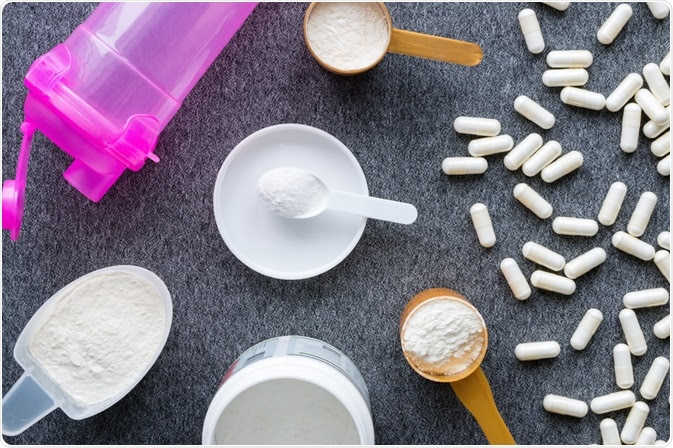By Osman Shabir, M.Sc.
Reviewed by Dr. Jennifer Logan, MD, MPH
Dietary proteins are essential for a healthy diet and development. Proteins break down in the body to their constituents, called amino acids, which are then used for protein synthesis by the cells of the body to survive and to replicate, amongst other important cellular processes.

Of the 20 amino acids needed for humans, 9 are considered to be essential, in that the body cannot produce them and they can only be obtained through dietary ingestion of proteins. A further 5 of the 11 remaining amino acids are considered to be conditionally essential, in that they may not be produced adequately in particular groups of people, such as children or during pregnancy.
In addition to the range of dietary supplements available over the counter, protein dietary supplements (including free amino acids and non-proteinogenic amino acids; NPAAs) are quite popular, especially among bodybuilders and athletes.
NPAAs are mostly naturally occurring, especially in plants, and participate in a variety of biological functions in the body, such as serving as metabolic intermediates in the production of endogenous compounds including neurotransmitters, l-arginine – which increases the production of nitric oxide (NO) that causes vasodilation (increased blood flow), muscle growth and energy production.
Are Protein Supplements Are Bad?
One NPAA compound used by athletes for increasing NO production is L-norvaline (molecular weight 117.1g/mol), which is predominantly an arginine inhibitor, and thus has several therapeutic effects. Due to the similarities between protein-building amino acids, NPAAs can closely mimic those and can potentially inhibit normal biological processes. For example, the NPAA l-m-tyrosine mimics l-tyrosine resulting in deleterious protein synthesis. L-norvaline mimics l-isoleucine (131.2g/mol), l-leucine (131.2g/mol) and l-valine (117.1g/mol) and its consumption as a dietary supplement could compete for endogenous protein-building amino acids to potentially cause deleterious effects in the body.

Over-the-counter l-norvaline can be found in dosages between 100mg and 400mg, either in capsule or powder form, effectively giving molecular concentrations between 3.4-13.6mM when dissolved in 250ml water, as instructed. One recent study investigated the cellular toxicity (cytotoxicity) of l-norvaline, published in 2019, that led to news stories about the potentially harmful impact of such supplements on health.
In that study, l-norvaline exposure to cells led to decreased cell viability even at concentrations as low as 125µM. When similarly structurally related amino acids such as l-leucine were added to the culture, the overall cytotoxicity of l-norvaline was reduced. Furthermore, researchers found altered mitochondrial structure indicative of mitochondrial dysfunction, similar to that seen in Alzheimer’s disease. L-norvaline did not lead to enhanced ATP production, which is what is marketed to do.
This study highlights the toxicity of l-norvaline supplementation even at lower dosages. Whilst the authors acknowledge that l-norvaline also has many potential therapeutic benefits, it is the first study to identify the negative effects of l-norvaline.
However, studies involving cells in culture have their own limitations and the effects seen in this study may not be the case for all cell types. Furthermore, the human diet would normally consist of other amino acids and not just l-norvaline, therefore the actual bioavailability of l-norvaline may actually be relatively low, with competition from other amino acids.
Are Protein Supplements Good?
With respect to l-norvaline, it has been investigated in animal studies for the potential treatment of Alzheimer’s disease. This is due to the fact it is an arginase inhibitor and can cross the blood-brain-barrier to prevent arginine loss in the brain. Mice treated with l-norvaline display improvements to cognitive ability as well as a reduction in the number of beta-amyloid plaques. The ill-effects as reported by Samardzic and colleagues are contested by Polis et al, who’s study showed that l-norvaline is well tolerated even at high concentrations.
Other protein supplements include whey protein concentrates (WPC), which are a rich source of specific amino acids and can be used as part of a healthy balanced diet. WPCs have an abundance of sulphuric amino acids. In one animal study, published by Garg and colleagues, rats were supplemented with WPC (300mg/kg for 28 days).
They found that markers of oxidative stress were significantly reduced. In addition, there was a significant reduction of inflammation markers such as TNFα, IL1β, and IL6. As such, WPC supplementation can lead to neuroprotective effects that prevent the progression of age-related oxidative stress and inflammation within the brain.
In summary, protein supplements, if used as part of a balanced healthy and active lifestyle are likely safe. However, some particular forms of non-proteinogenic amino acids (NPAAs), which mimic other related amino acids, may inhibit normal cellular processes potentially leading to deleterious effects, though much more research is needed to validate this and some studies have contested these claims.
Overall, the use of protein supplements does not seem to have major negative effects on the brain if used as part of a healthy, balanced and active lifestyle.

Leave a Reply